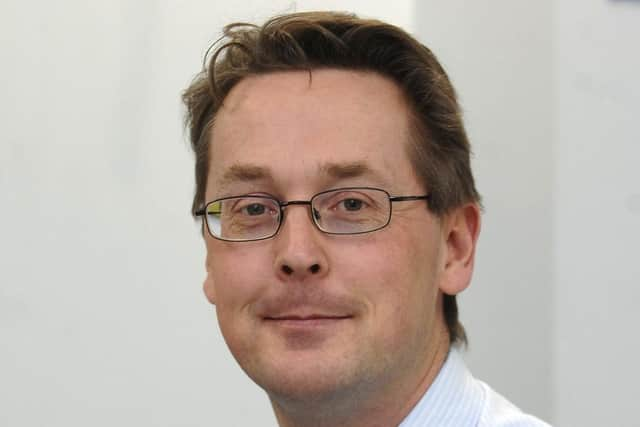Urgent mental health referrals in Wigan rose by nearly one-third in pandemic
and live on Freeview channel 276
Concerns were raised last year about the impact of several lockdowns on people struggling with mental illness and the pressure on NHS services across the country.
An analysis of data by the Wigan Post and the BBC Shared Data Unit has now revealed that the number of urgent crisis care referrals to NHS Wigan Borough CCG rose by nearly one-third.
Advertisement
Hide AdAdvertisement
Hide AdThese are made when a patient is suffering a more serious mental health crisis and needs help faster than they would get through a normal referral route.


While there were an average of 374 urgent referrals per month between April 2019 and April 2020, this rose by 32 per cent to 494 per month between May 2020 and March 2021.
But the number of regular monthly referrals to mental health services fell by 16 per cent, from 3,395 in February 2020 to 2,850 in March 2021.
The drop was particularly seen in April and May last year, during the first national lockdown, possibly as people struggled to access services through GP surgeries.
Advertisement
Hide AdAdvertisement
Hide AdBut health services adapted to deliver care safely and the number of referrals started to rise. Contacts with adult mental health services - after patients have been through the referral process - went up by six per cent from February 2020 to March 2021, from 6,415 to 6,795.
Dr Tim Dalton, a GP and chairman of NHS Wigan Borough CCG, said: “The last 18 months have been challenging. As we come out of lockdown we know many more people are struggling with their mental health. If you are struggling I would urge you to contact your GP to talk about this. Whilst GP practices may ask you to phone or submit your query online first, they are open and will help you get the support you need.
“If you require urgent help with your mental health, you can also call the local crisis line for free on 0800 051 3253 which is open 24/7.”
In Wigan, mental health services have introduced a range of support to help people dealing with mental illness. This includes a 24/7 crisis line, a mental health support hub and a dedicated campaign to ensure residents are aware of the support available. These measures are thought to have led to an increase in referrals for support, as more people become aware of the help on offer.
Advertisement
Hide AdAdvertisement
Hide AdAcross England, the number of monthly referrals to mental health services have hit their highest point in two years. Figures show at least 279,995 referrals were made through 117 NHS clinical commissioning groups in March 2021, a rise of 19 per cent from February 2020.
Referral numbers plunged by 27 per cent during the early months of the pandemic, mirroring the situation in Wigan, but have steadily climbed since.
Urgent crisis care referrals are also at their highest point in two years. In all, 15,570 urgent referrals were made to crisis care teams during March 2021.
The number of people in contact with adult mental health services plunged by 104,955 between February and April last year when the pandemic struck.
Advertisement
Hide AdAdvertisement
Hide AdThough these figures have improved slightly, latest data from March 2021 still shows 66,915 fewer people in contact with services compared to February 2020.
Mental health charities in England have urged the Government to act. Mind’s head of health policy Geoff Heyes said: “When you see those figures reaching record levels it’s a real alarm bell for problems elsewhere in the system, where people aren’t getting support quickly enough.
“Our fear is that more people will be struggling because of the economic impacts that we have yet to see.”
He said only about 40 per cent of people with a diagnosable mental health problem would get treatment before the pandemic, so there was likely to still be a gap between the number of people needing help and those getting it.
Advertisement
Hide AdAdvertisement
Hide AdSane’s chief executive Marjorie Wallace said: “It is no surprise that we are seeing a jump in referrals, which could mark the start of a surge that lasts for many months, as people with severe mental ill-health who were discouraged from seeking help finally come forward. Yet services that were already over-stretched before the pandemic may be even less able to cope with rising demand due to increasing staff absence, and with patients who are much more acutely unwell having not received early support.
“We have to be prepared for a mental health crisis and people needing urgent treatment.”
A spokesman for the Department of Health and Social Care said: “Covid-19 has affected everyone in the UK and we recognise it has had a disproportionate impact on certain groups of people.
“Throughout the pandemic, community and crisis services have continued to provide support, including by using digital and face-to-face appointments. As we look beyond the pandemic we remain committed to expanding and transforming mental health services in England, backed by £2.3bn a year by 2023/24.
Advertisement
Hide AdAdvertisement
Hide Ad“Our mental health recovery action plan – supported by £500m – will ensure we offer the right support in 2021/22 to help people with a variety of mental health conditions, including bringing forward the expansion of integrated primary and secondary care for adults with severe mental illness.”
If you need help with your mental health, speak to your GP or call Wigan’s mental health urgent response team on 0800 051 3253.
Alternatively, for someone to talk to, call Samaritans on 116 123.
Thanks for reading. If you value what we do and are able to support us, a digital subscription is just £1 for your first month. Try us today by clicking here